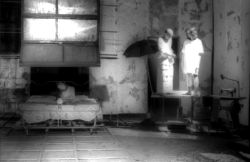
Faithful recording of the movements of the mind of a man getting in touch with an empty space.
In front of him a burned wall, burned by the fire. He waits. He sits on the ground and looks. The train of the lives, which appear on that place, runs fast, parallel tracks leave continually. He knows well that his acting will not help him to be known to the world, as for knowing the world better. He sends patrols to reconnoitre the ground, creates outposts in a territory that, if he cannot call hostile, has different rules and other logic. Where will he find the strength, this time, to activate relations with other figures and with other materials? Whom am I talking about? I am moving myself few millimetres a day. I do not belong to myself for sure.
The man of the tale becomes the man who tells. He waits for a little door to be open wide. He has patience. The patience of the unwise one, of the next one. He travels over men, he abhors the human approval. He finds them on the pavement, in deserted blockhouses, where the smoke has difficulty going out, he sits between them, not seen, almost never trampled, always smelled. He leaves a recognisable trail, from who? He is there, with a hammer in his hands, two nails. His legs bend themselves, it is a fall downwards, his pelvis gathers the remains of his body and leads them towards the ground. The burden of the text thrown by the other offends him. The executioner is ready to deal the blow.
And the loop starts. He is dragged by the description of what is happening, he is inclined to the suicide but he backs away from it for ever, he grants to the theatre the word “extractor” well knowing that he is throwing to you and to himself the dart of the illusion. And yet it is this that moves him and that moves boulders instead of him, he puts them on the summit and throws them as if they were lightning. The passers-by turn themselves, they are untouched, unaware. Are you there? You may also use those “so-so”, you can do what you want of them. But you will never have them. Where am I now? He passes his forearm in front of his eyes. Everything disappears. You must get back. . . and he goes to the start point. He is conscious that he is living in an illusion. Day after day he tries to strengthen the image. And he elaborates structures of relation which allow him to forget that he has forgotten. The definitive abandonment of the simulation reaches him in the moment in which he succeeds to affirm that the world in which he lives is a prison. And he prepares himself with all his strengths to abandon it. Someone tells him that actually we see, or rather we always perceive and hear only examples. And from all this he builds the street on which proceed. He establishes the rule that must to be shattered.
It is a long time since he saw in the Stalker and in Tarkovskij a clear example and in the brothers Strugatski the possibility of an example. When he thinks back to that glass door which separates the place of the vision from the place of the wait, he sees a man separated from the other, the place of the scene and the place of the audience. He sees a door, the obstacle, and he sees an eye of the world that comes beside the place where the acting becomes his eye. The door that is wide open and the stand that moves forward lightly on the tracks: these are the solid need to confirm the occurrence of the thought, of the desire, of the abandon. The fact anticipates itself and ripens in its ending. There isn’t any more time. Our train has arrived. And we are with them. The impossibility of being there. The stalker places his arm on the plate of a steelyard. It is not there. The weights are smiles, anxieties, memories. We are forced to leave that place, simply pulled away. How he would like to stay there, with them. Someone throws a screw nut. Walls are open, a portal moves forward and it sets the limit to the action. And Arthur climbs up the hill, the other figure stands with his face turned somewhere else. Timeless looks. The eyes are bent asking for a beginning. Because weakness is strength and strength is nothing. Listen to him, he is not with them. On the board of that dissecting table, behind the scene. Beside him there is a sewing machine and an umbrella. He is in the dark. The lights are beyond. On that bed of solitude and death he hears them to go down the hill, the steps of the meeting, the voice is nipped in the bud.
Happiness,
happiness for everybody. Nobody will go away from here unsatisfied!
| con |
| Daniela Bianchi, Eleonora Sedioli, Andrea Basti, Lorenzo
Bazzocchi, Roberta Raineri, Catia Gatelli, Olivier Caumod |
| suoni e mappatura ambiente |
| Mirko Fabbri |
| luci |
| Lorenzo Lopane |
| architetture sceniche |
| Lorenzo Bazzocchi |
| allestimento |
| Eleonora Sedioli, Andrea Basti, Roberta Raineri, Manuela Savioli, Lorenzo Bazzocchi, Catia Gatelli |
| assistente alla regia |
| Catia Gatelli |
| regia |
| Lorenzo Bazzocchi |
| organizzazione, ufficio stampa |
| Catia Gatelli |
| produzione |
| Associazione Culturale Masque, Festival Crisalide |
| col contributo di |
| Ministero per i Beni e le Attività
Culturali |